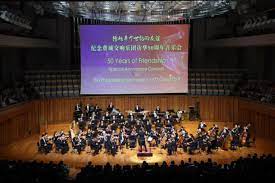By Wu Lejun, Zhang Mengxu, People’s Daily
Chinese President Xi Jinping recently replied to a letter from Matias Tarnopolsky, president and CEO of the Philadelphia Orchestra, the first American orchestra to perform in China after the founding of the People’s Republic of China.
Xi said in his reply that half a century ago, the orchestra’s historic China tour marked a thaw in China-U.S. cultural exchange, which was a very important part in the normalization of the two countries’ diplomatic relations.
Since then, the orchestra visited China 12 times as an active cultural envoy, playing an instrumental role in strengthening China-U.S. ties.
Xi said it was a pleasure to learn that the Philadelphia Orchestra would visit China in November for the 13th time and join the Chinese side to celebrate the orchestra’s China tour in September 1973 with musical performances and activities and renew the 50-year musical friendship between the orchestra and the Chinese people.
On the evening of Nov. 10, the 50 Years of Friendship Special Anniversary Concert of the Philadelphia Orchestra’s 1973 China Tour was staged at the National Center for the Performing Arts in Beijing.
The concert was jointly presented by the Philadelphia Orchestra and the China National Symphony Orchestra. As young conductor Tristan Rais-Sherman of the Philadelphia Orchestra gently lifted his baton, the Overture to Candide composed by American conductor Leonard Bernstein was performed. After the uplifting piece, a serene and melodic tune started, the well-known Er Quan Ying Yue (Two Springs Reflecting the Moon), which witnessed the 50-year friendship between the Philadelphia Orchestra and the China National Symphony Orchestra.
Rais-Sherman said the concert was an honorable moment, and its repertoire was a homage to the Philadelphia Orchestra’s 1973 China tour.
He noted that the Echoes of Ancient Tang Poems staged in this concert was a new composition combining Western and Chinese symphonic music. In January this year, he performed excerpts from it in Philadelphia and New York, and received positive response.
It was through that performance that Rais-Sherman was exposed to Chinese Tang poetry and characters. He called it a fascinating cultural interaction, which made him appreciate China’s rich historical and cultural heritage. He said he will learn and study Chinese culture his entire life.
Philadelphia Orchestra cellist Ohad Bar-David said that Xi’s reply made the concert this time even more extraordinary.
He told People’s Daily that he was touched and honored to hear that Xi said the musical performances and activities this time would renew the 50-year musical friendship between the orchestra and the Chinese people.
Music is a bridge of communication for people, and music and friendship are the common assets of the Chinese and Americans, he noted, adding that the assets should be passed on by musicians.
Ryan Fleur, executive director of the Philadelphia Orchestra, said he believes that music transcends borders and facilitates communication in ways that words cannot express.
The Philadelphia Orchestra’s visit to China this time aimed at using music as a medium to promote understanding between the Americans and Chinese, he told People’s Daily, adding that he was delighted to share these cross-cultural musical works with the Chinese people.
“President Xi’s reply has further strengthened our confidence in continuing to promote cultural exchanges between China and the United States,” said Zhou Yu, Party secretary of the China National Symphony Orchestra.
In his reply, Xi emphasized the importance of cultural exchanges between China and the U.S., which is a great encouragement to artists, Zhou said, adding that as the first national-level orchestra in the history of the People’s Republic of China, the China National Symphony Orchestra has played an important role in music exchanges between China and other countries.
“Music originates from life, yet transcends it. It interprets a country or a nation’s understanding of the world and its thoughts on the future. Artists from China and the U.S. can better serve as bridges and messengers, thus playing a greater role in promoting cultural exchanges and mutual learning,” Zhou remarked.













